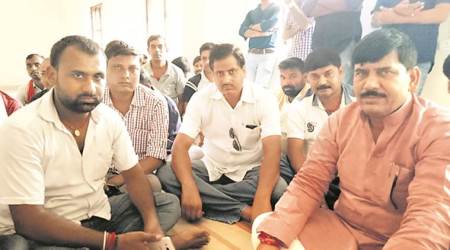 Indra Nagar football team at BPT ground,Reay Road. (Express photo by Kevin DSouza)
Indra Nagar football team at BPT ground,Reay Road. (Express photo by Kevin DSouza)
Until two years ago, children in Indira Nagar at Haji Bunder sneaked out of their homes to play football and on their way back, erased all evidence that could have indicated they had been out in the coal-filled air. On Saturday, with the blackness gone from sight, they breathed in air cleaner than ever before to win a football match in the coal-free area.
The locality surrounding Haji Bunder in Sewri had become synonymous with tonnes of imported coal forming mountains on the 13 acres of land and black sooty dust carried by the wind would coat homes in Indira Nagar and the Indian Maritime University (IMU) and Lal Bahadur Shastri College of Advanced Maritime Studies and Research. The only road leading out of Haji Bunder sees round-the-clock movement of trucks bearing heavy cargo, which included coal until two years ago.
It was only after NGO, Aapli Mumbai, filed a Public Interest Litigation in the Bombay High Court asking that the Mumbai Port Trust stops coal handling in the city that the eastern seafront was rid of coal pollution. Acting under the court’s directions, the port trust finally decided to end coal handling in October 2015.
Still, it took at least a year to clean up the area.
A N S Neti, an engineer officer at the IMU, points from his third floor office towards vegetation around the campus that has never been greener. “Everything out there was covered in black. Every day, we had to clean the walls of the buildings because they would be covered in coal dust,” he said. Students at the university, who live in hostels on the campus, also suffered. Neti said several students in the previous batches suffered respiratory disorders.
Closing in on two years of being coal-free, Aapli Mumbai felt that a friendly football tournament on the ground that pollution had rendered under-utilised would make for a good celebration. The tournament that has eight teams participating kicked off last Saturday and with one game played every week, it will conclude in November.
“We are trying to tell people that they should come here and play in the clean air,” said R Balakrishnan, Vice- President, Aapli Mumbai.
Saturday was the first game for one of two home teams, Indira Nagar’s I N Strikers, a club founded only two years ago. “Earlier, we had become used to living and playing in air full of coal dust. That made a lot of us sick. Each time we walked from home to the ground, our legs would be covered in black sludge,” said Khatal Hussain (20).
Having contracted tuberculosis after growing up in Indira Nagar, it was only a combination of drastically improved air quality and a few months outside Mumbai that cured Hussain. “The coal dust flying from the trucks made it impossible to see anything on the road,” he said.
While many of the boys in the Strikers squad trained with the NGO, Magic Bus, that first set up serious football coaching in the area a few years ago, living in a densely polluted locality has clearly taken a toll on their bodies.
“Look at how skinny we are. It is not like we don’t eat but when the air here has been so bad for so long, we are bound to look weak,” said an 18-year-old player from the team. However, in the two 20-minute halves that they played on Saturday evening, the Strikers outclassed their old and beefier opponents in F C Dadar and winning 1-0.
“That is because we don’t give up. We know the kind of living conditions we grew up in. And now, we are very happy that the air is clean,” said Mayur, another player in the Strikers team.







